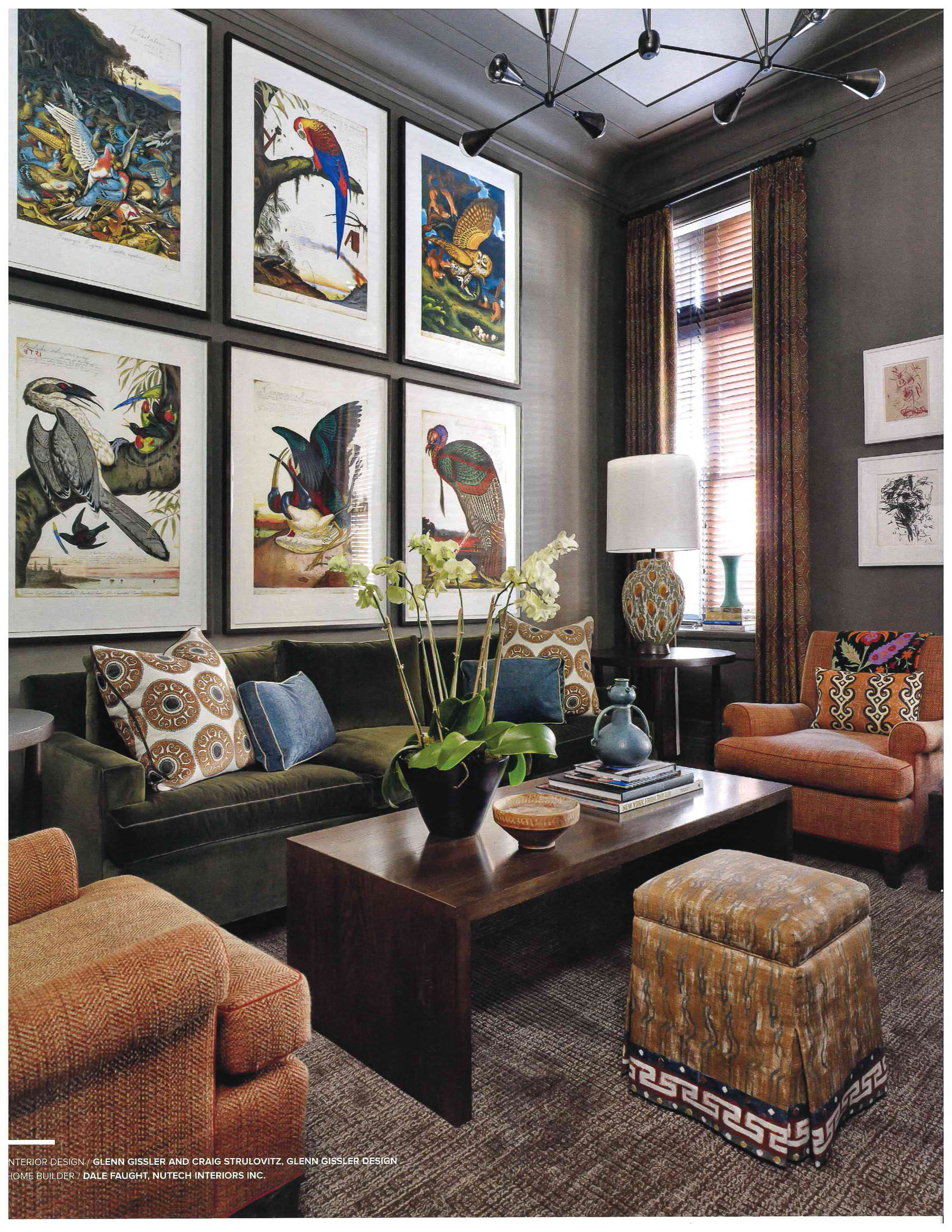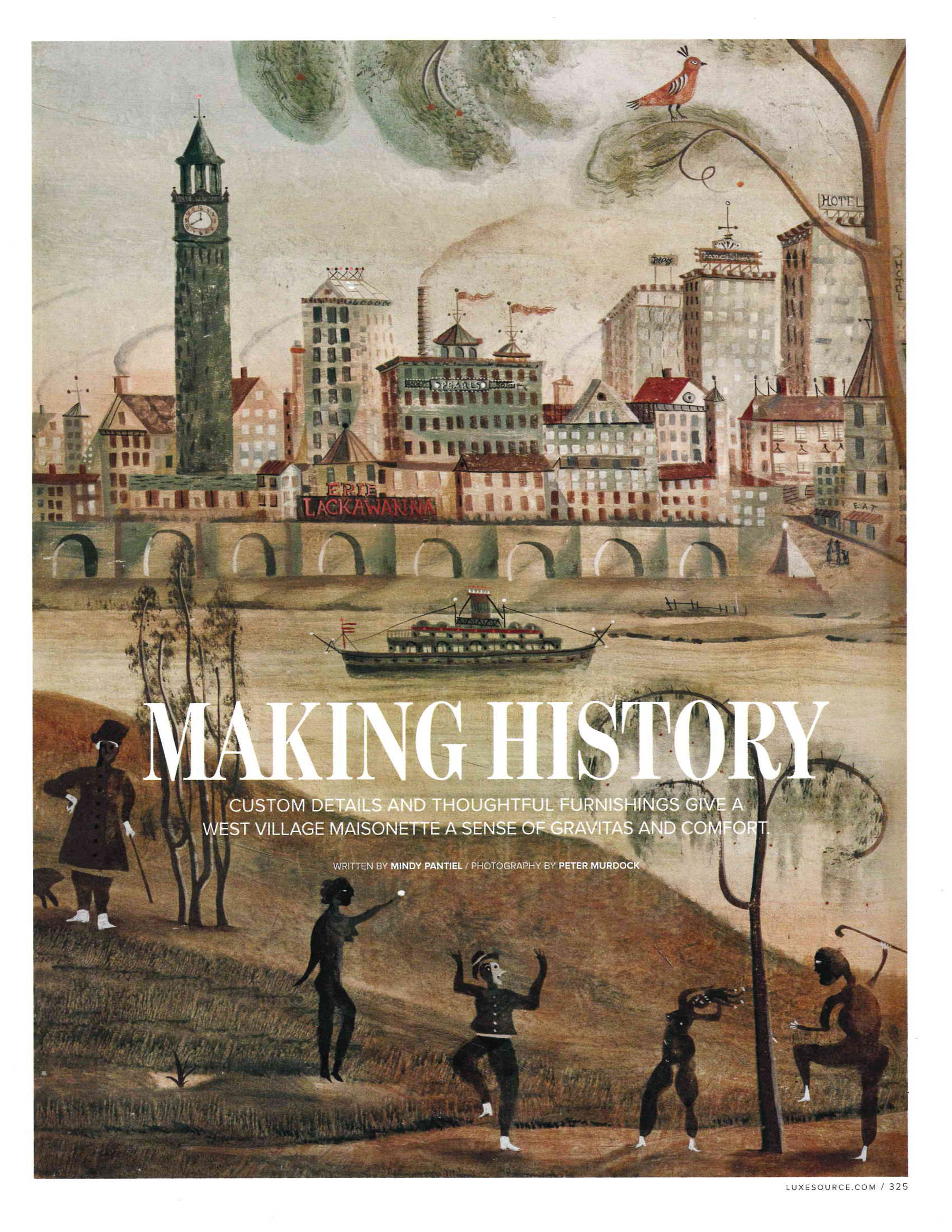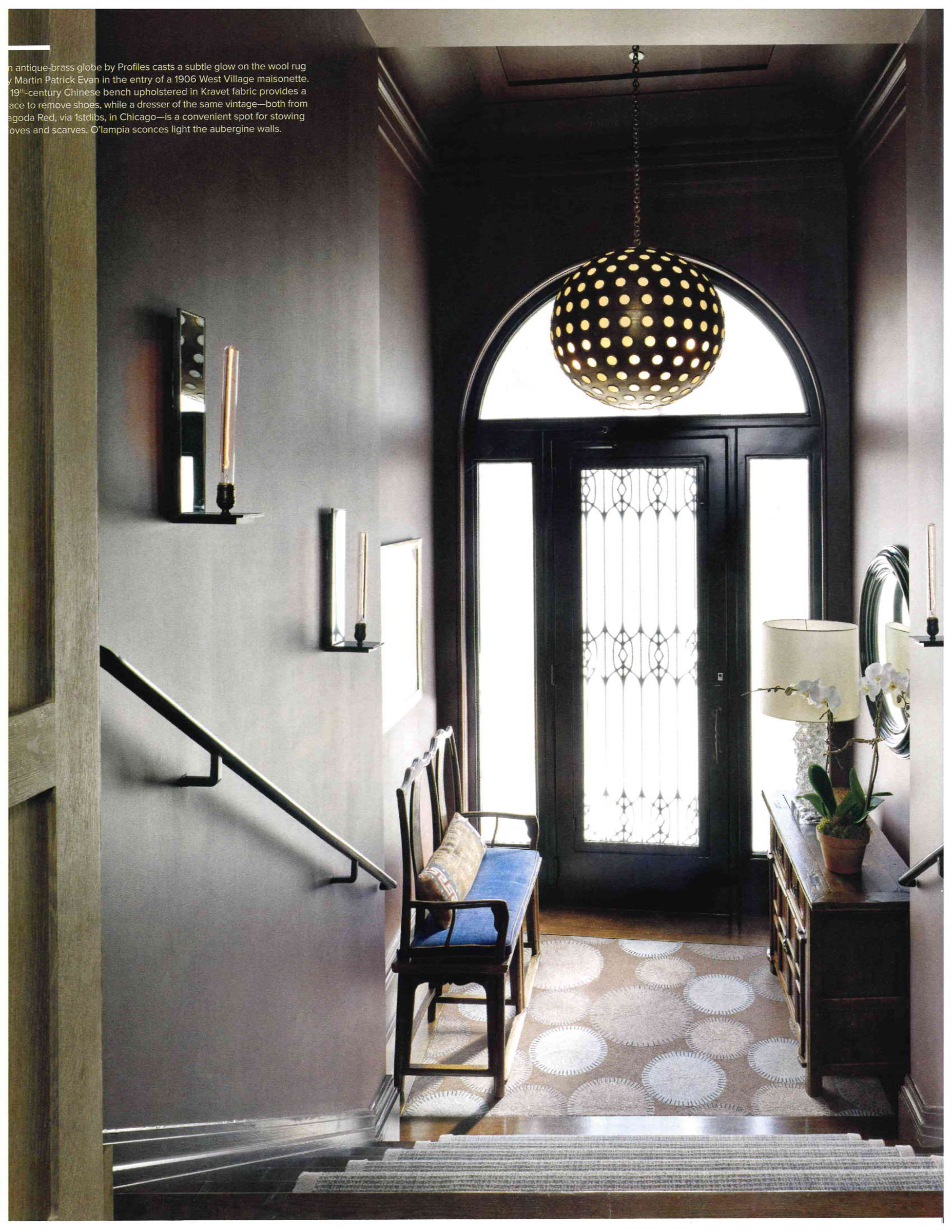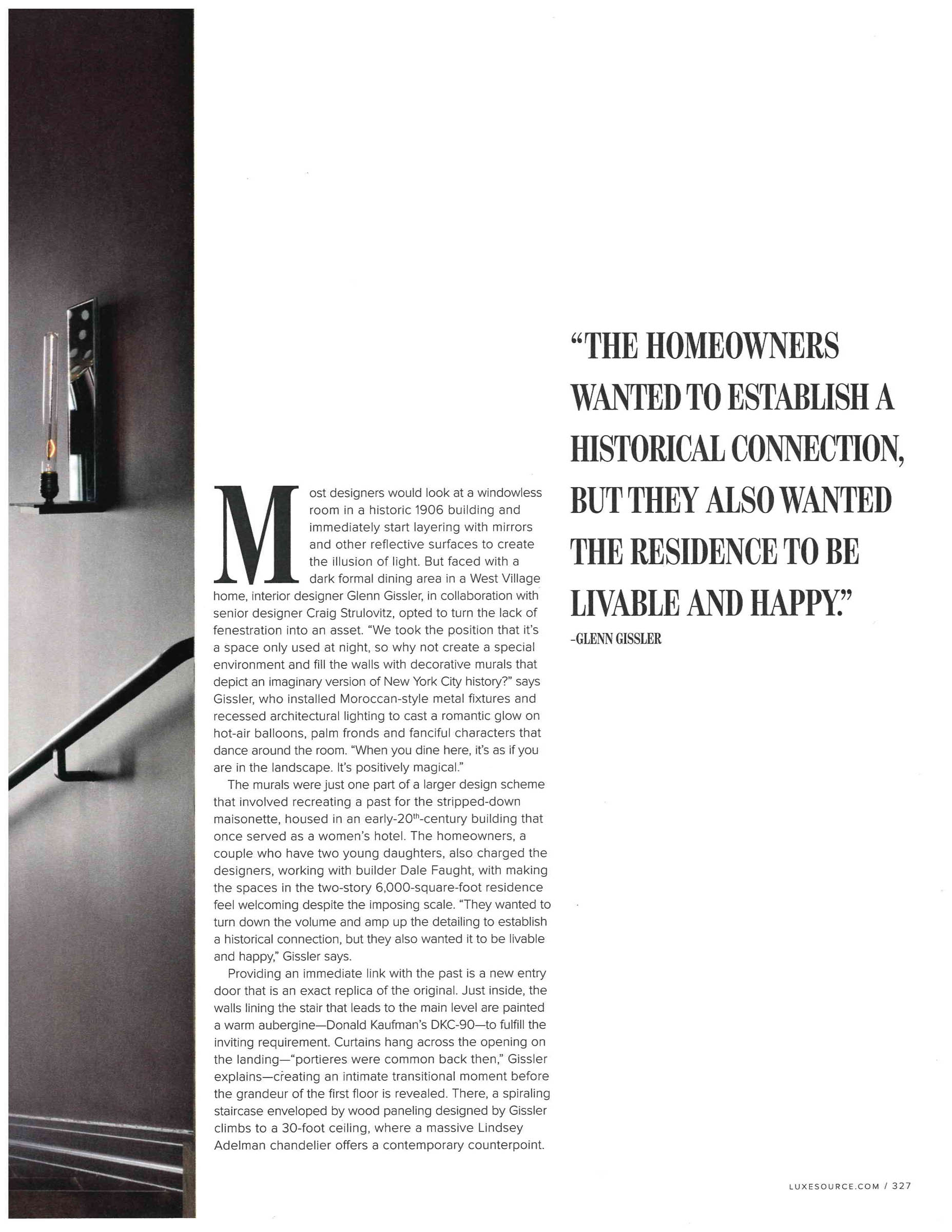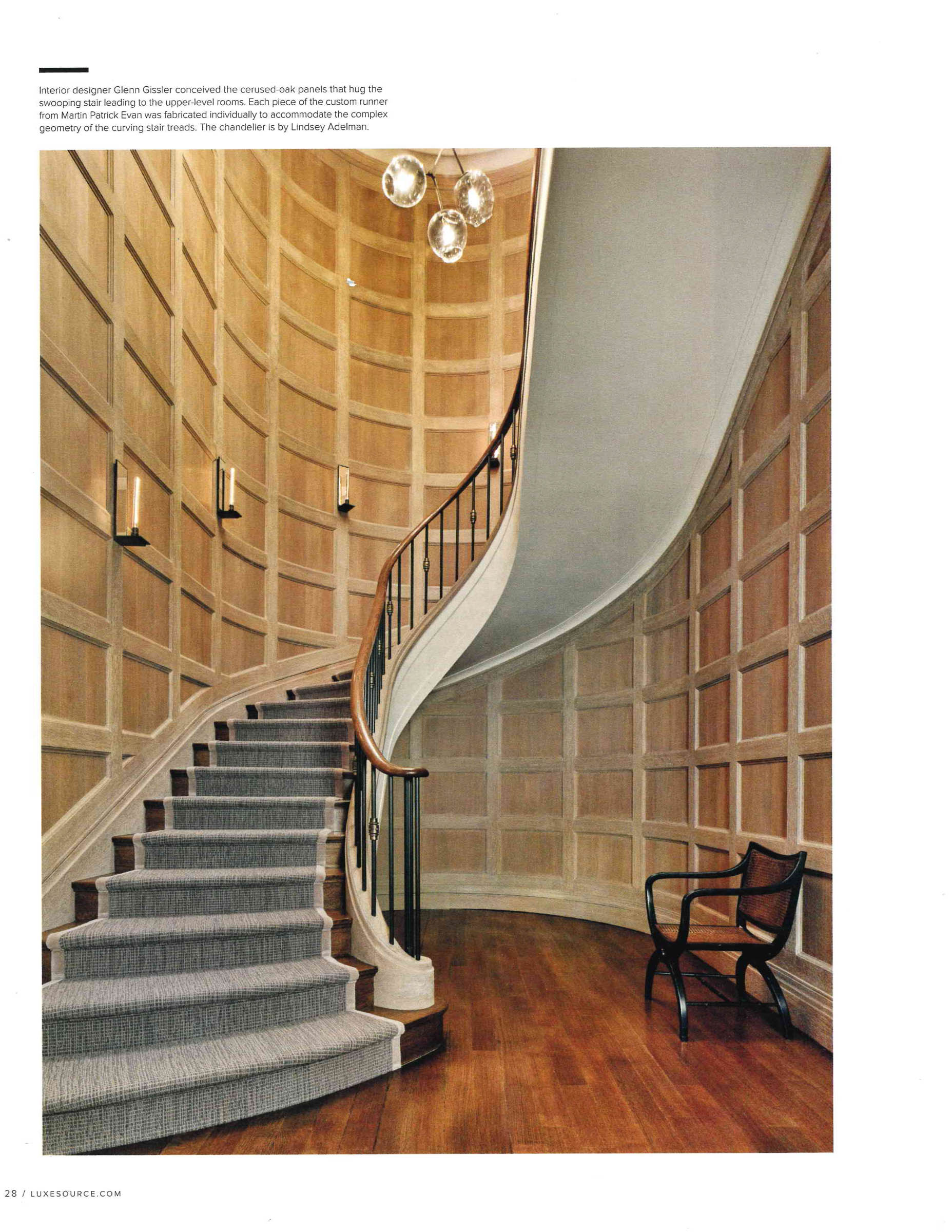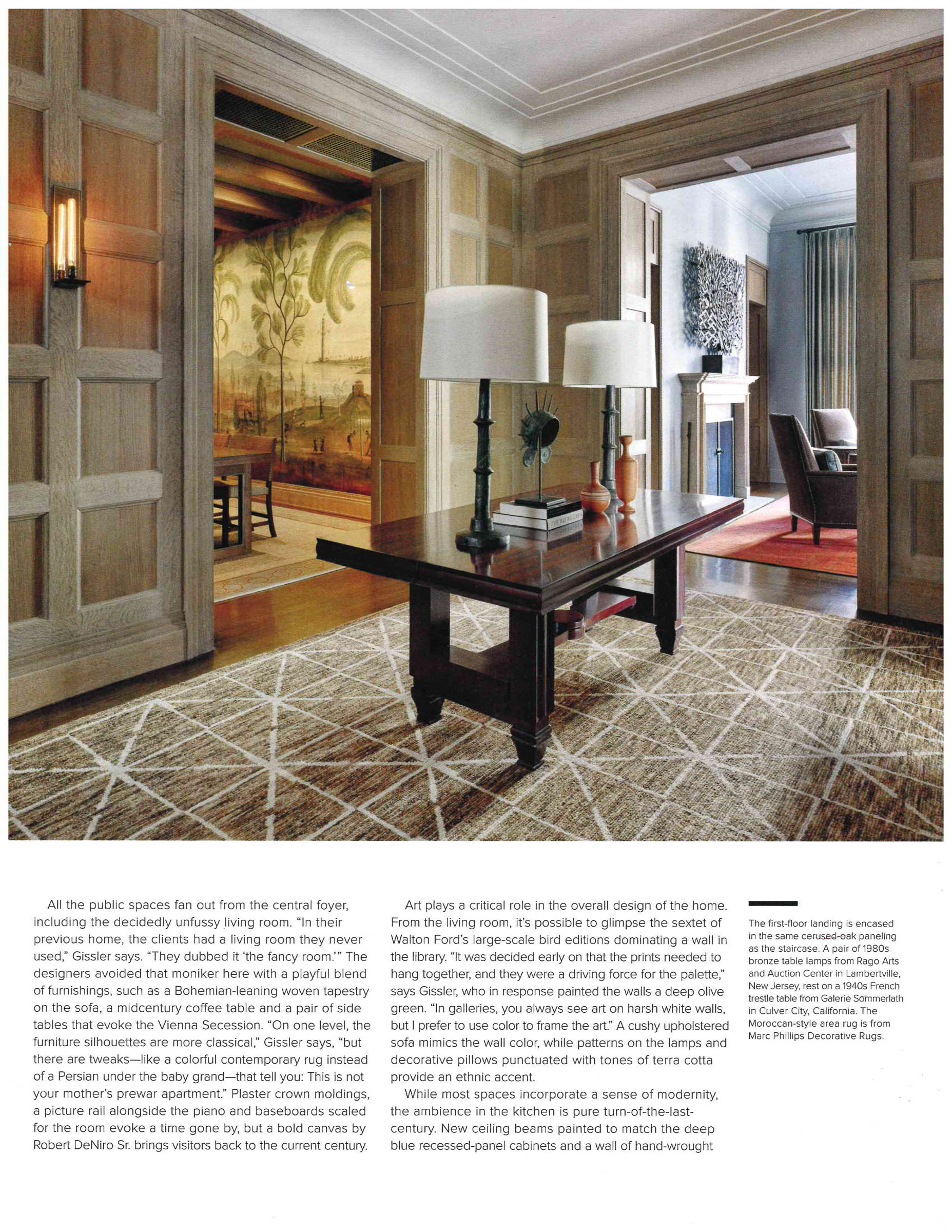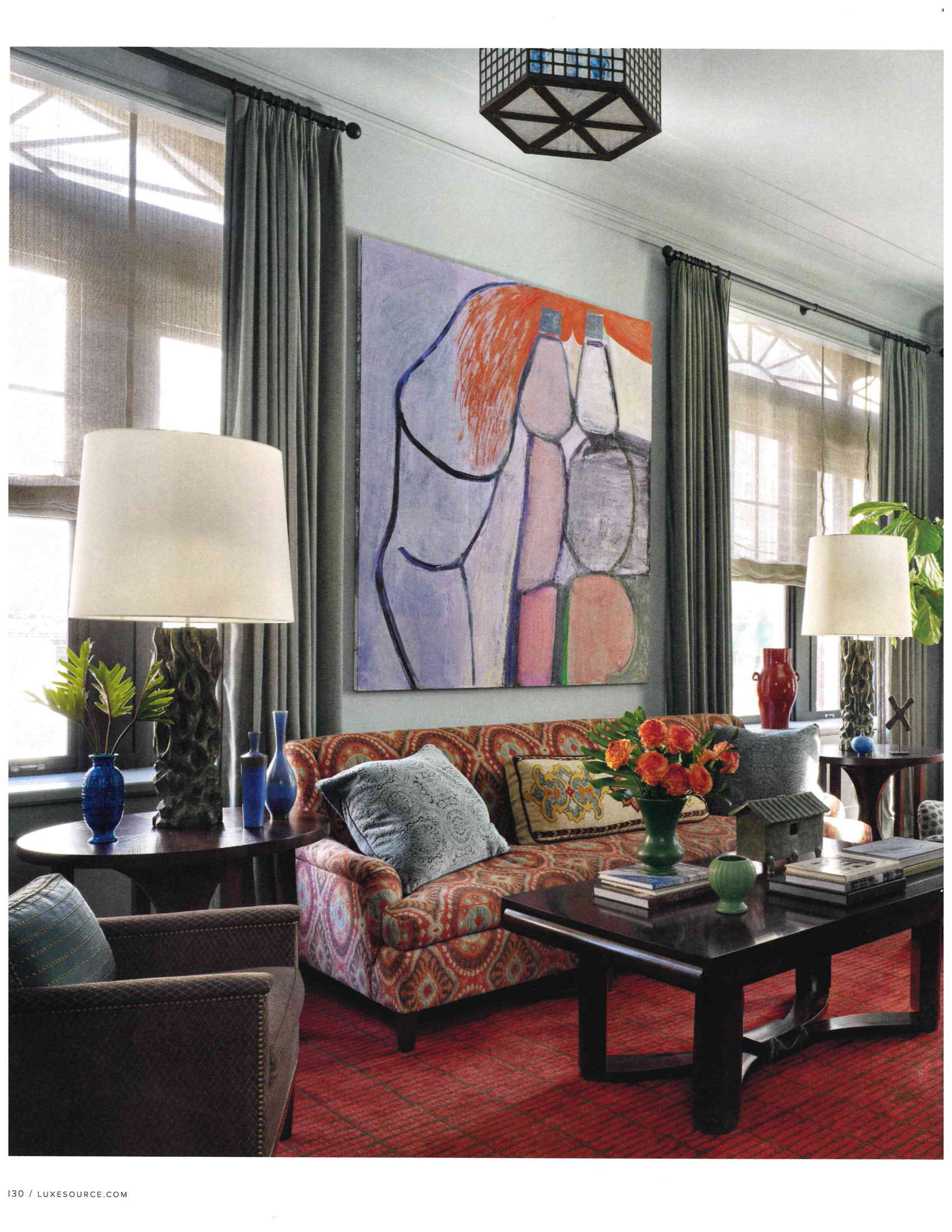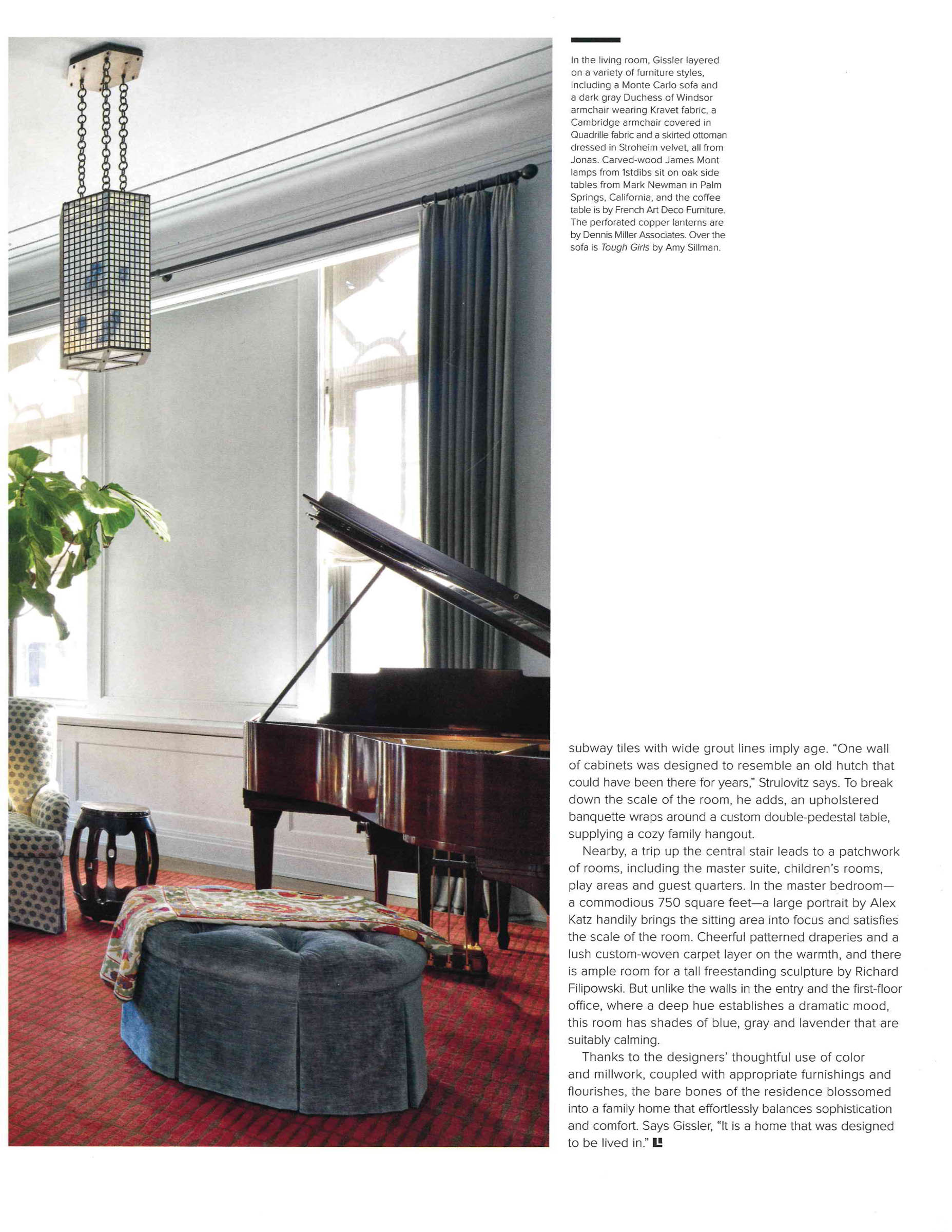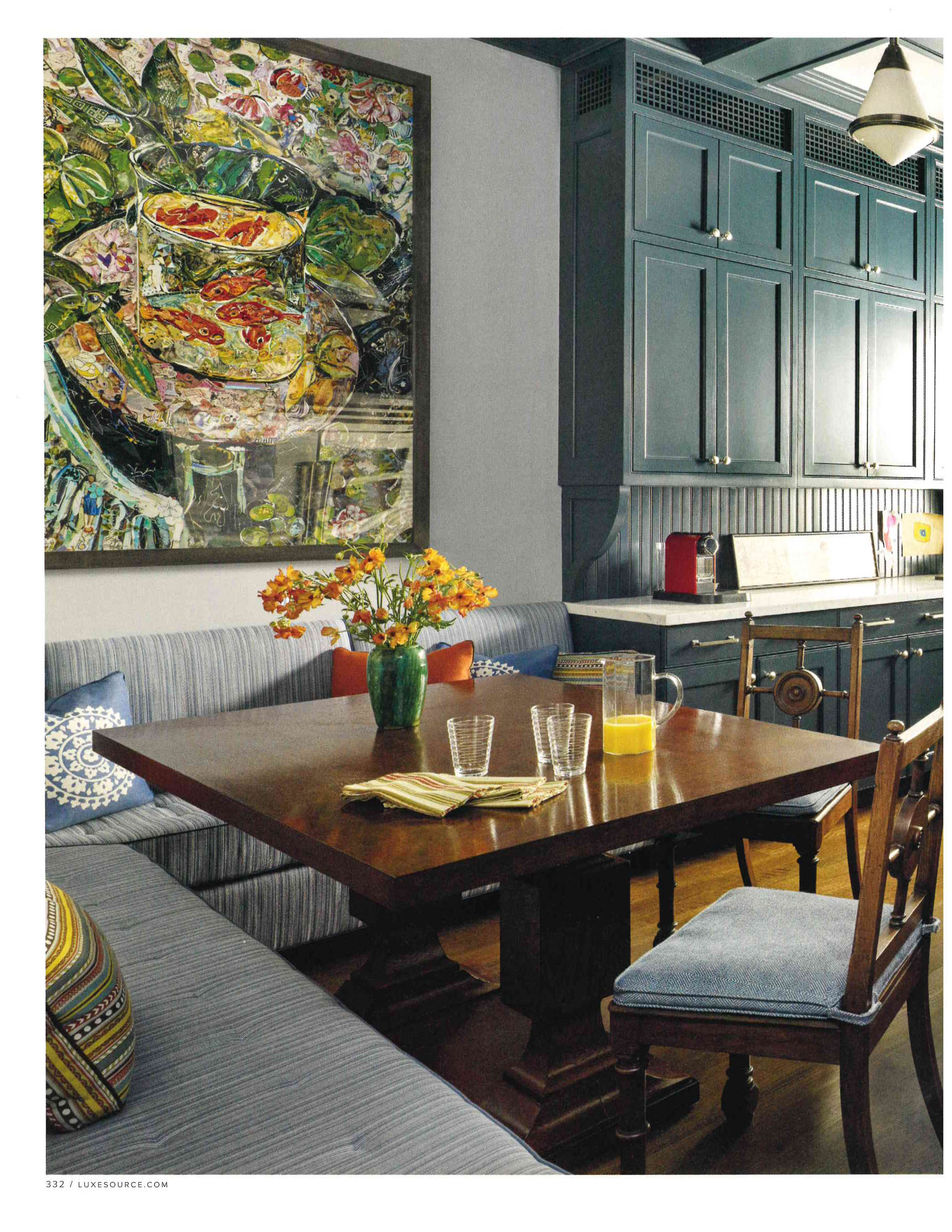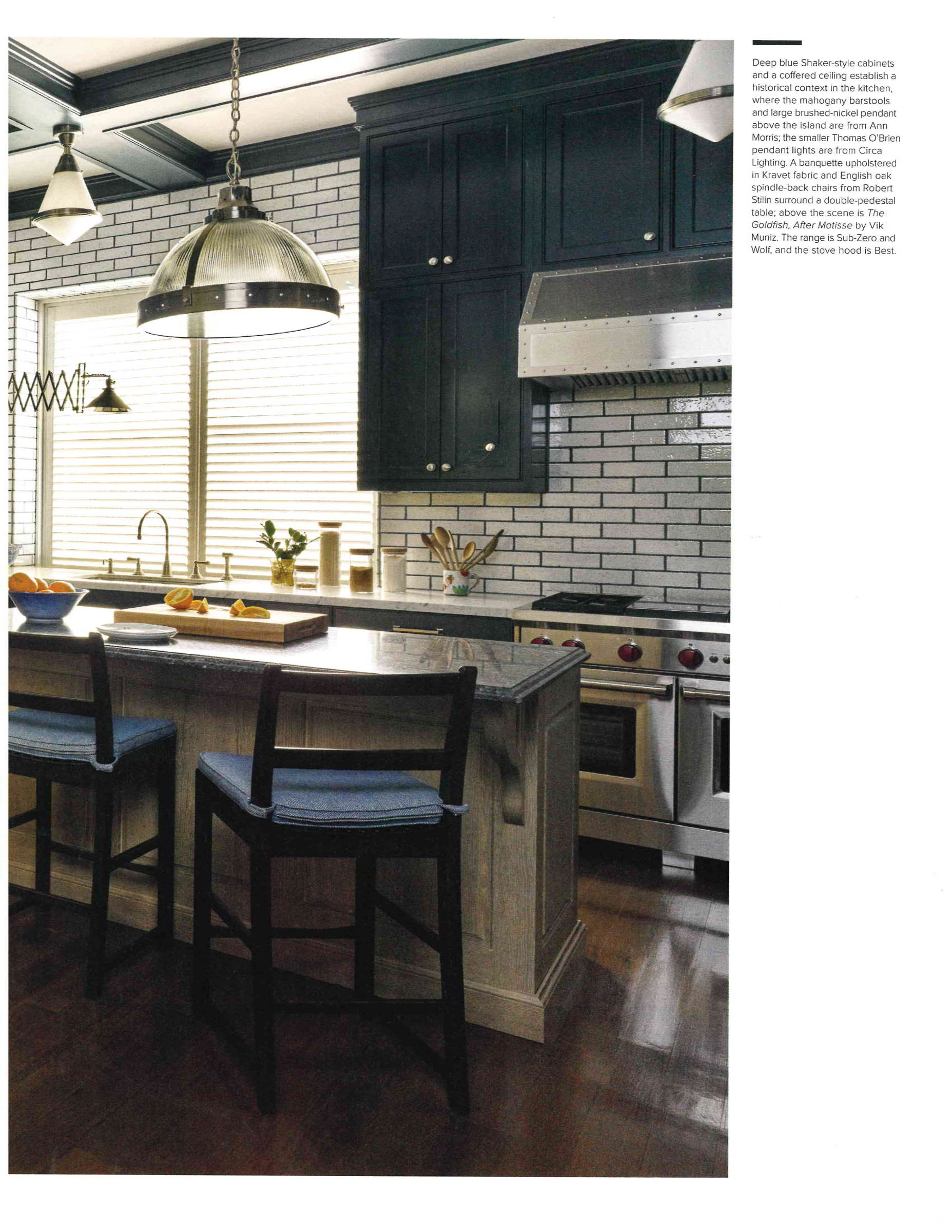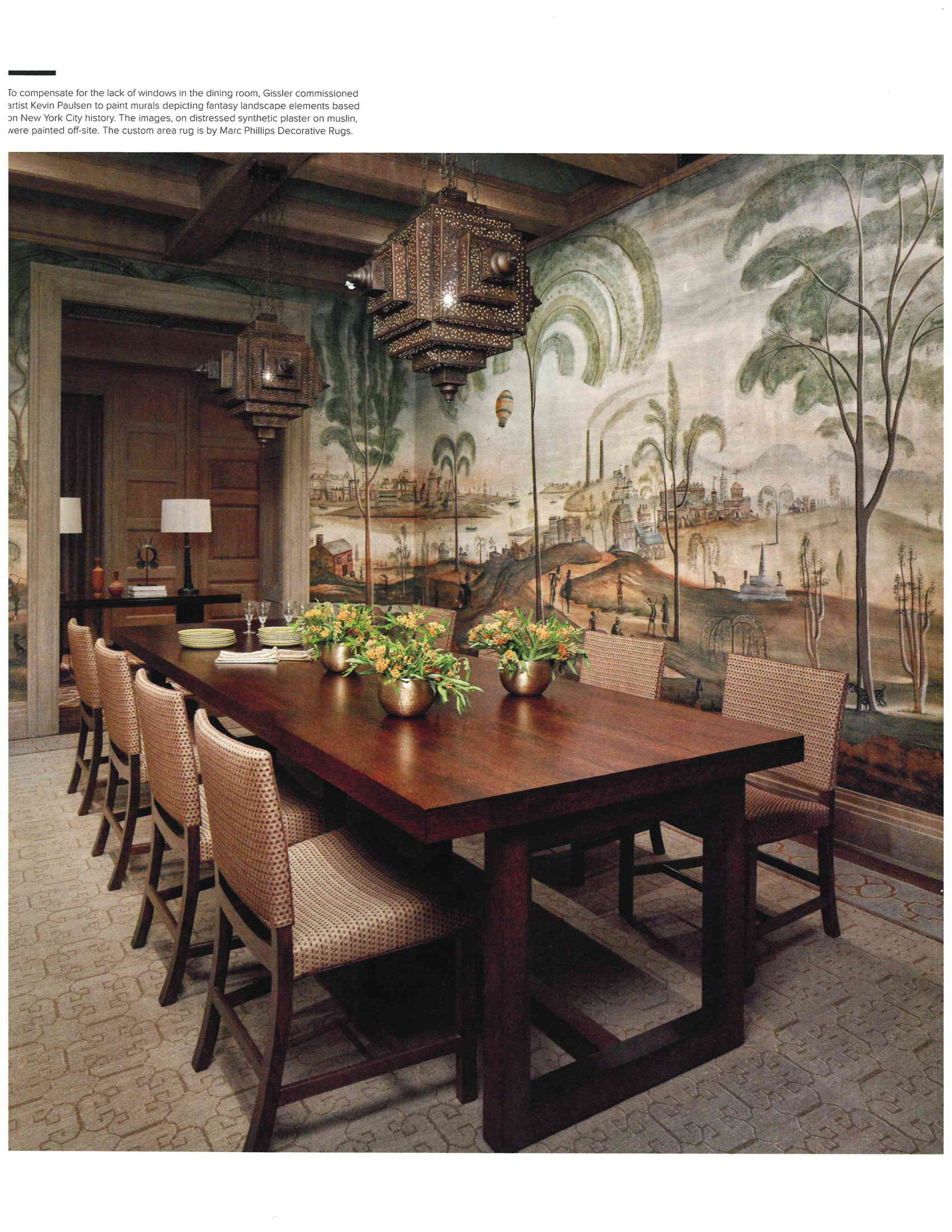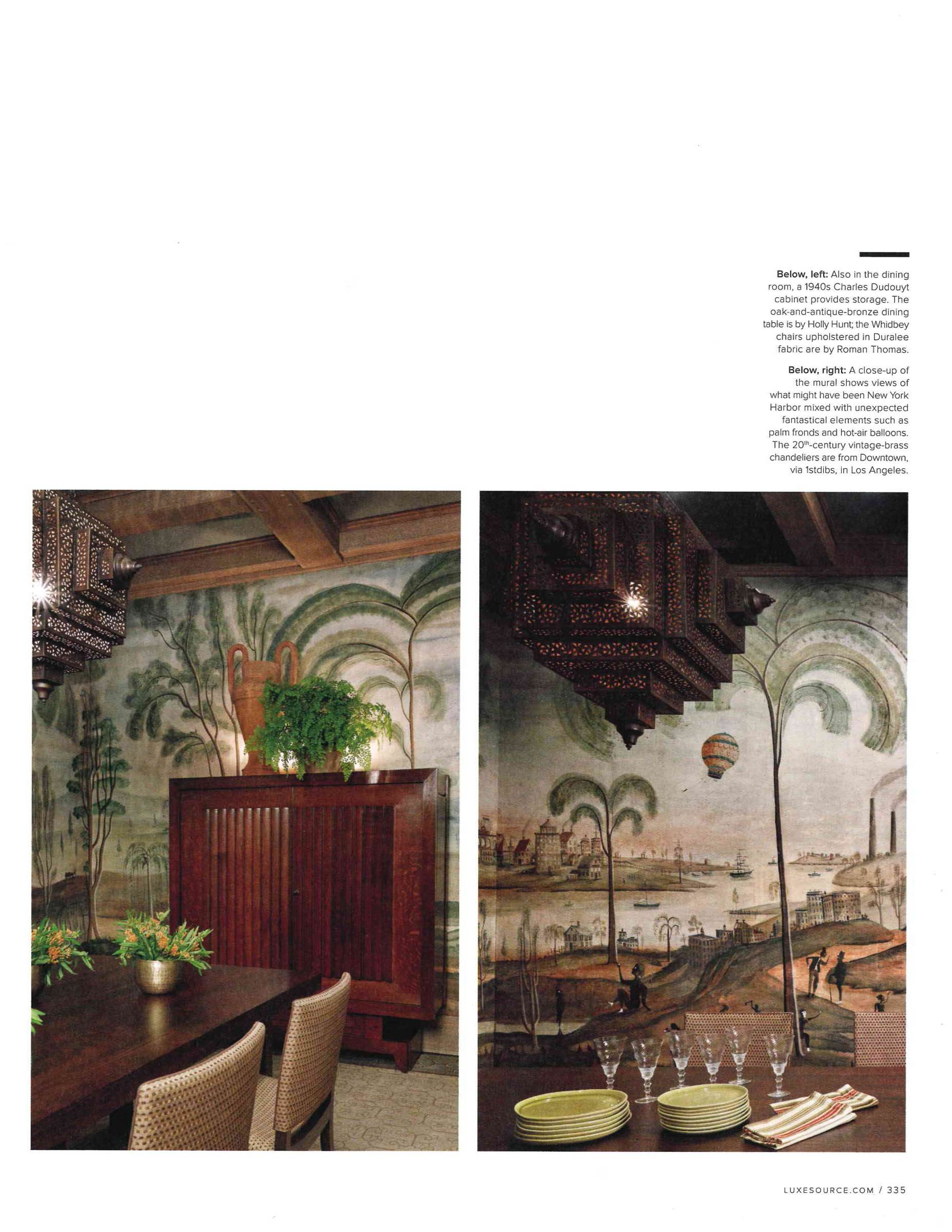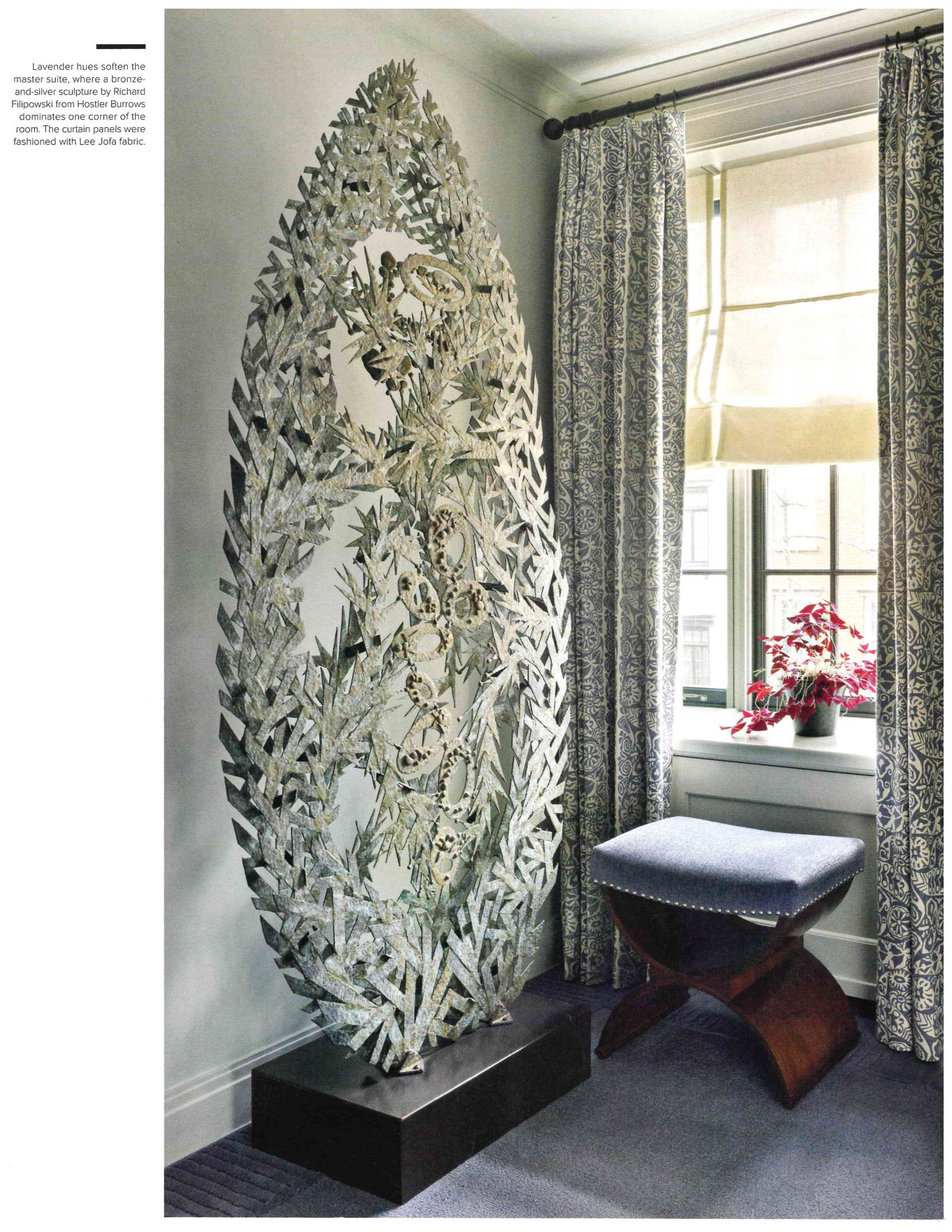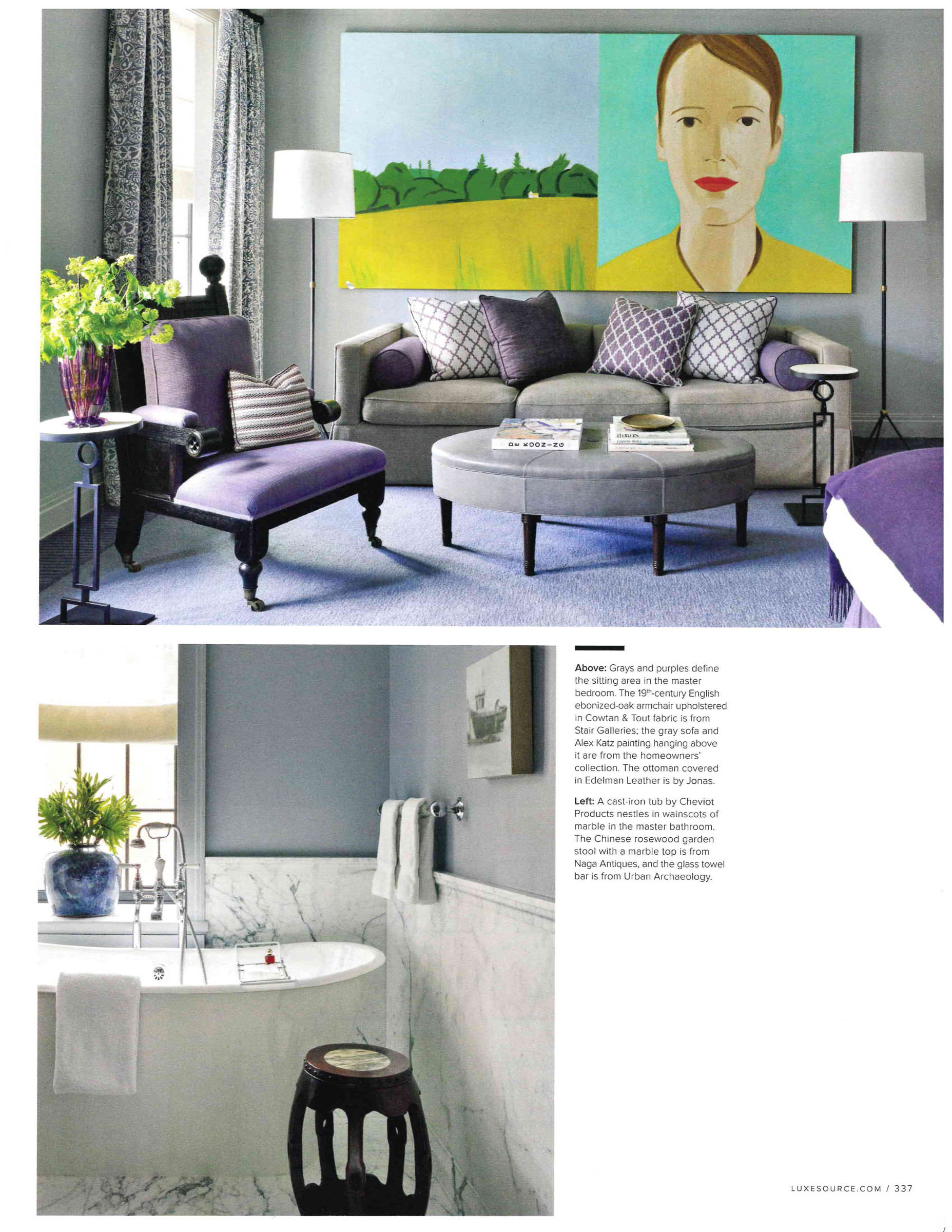Making History
by Mindy Pantiel
Photography: Peter Murdock
Interior Design: Glenn Gissler & Craig Strulovitz
Home Builder: Dale Faught, Nutech Interior, Inc.
September 2017
Custom Details and thoughtful furnishings give a West Village Maisonette a sense of gravitas and comfort
Most designers would look at a windowless room in a historic 1906 building and immediately start layering with mirrors and other reflective surfaces to create the illusion of light. But faced with a dark formal dining area in a West Village home, interior designer Glenn Gissler, opted to turn the lack of fenestration into an asset. “We took the position that it’s a space only used at night, so why not create a special environment and fill the walls with decorative murals that depict an imaginary version of New York City history?” says Gissler, who installed Moroccan-style metal fixtures and recessed architectural lighting to cast a romantic glow on hot-air balloons, palm fronds and fanciful characters that dance around the room. “When you dine here, it’s as if you are in the landscape. It’s positively magical.”
The murals were just one part of a larger design scheme that involved recreating a past for the stripped-down maisonette, housed in an early 20th-century building that once served as a women’s hostel. The homeowners, a couple who have two young daughters, also charged the designers, working with builder Dale Faught, with making the spaces in the two-story 6,000-square-foot residence feel welcoming despite the imposing scale. “They wantd to turn down the volume and amp up the detiling to establish a historical connection, but they also wanted it to be livable and happy,” Gissler says.
Providing an immediate link with the past is a new entry door that is an exact replica of the original. Just inside, the walls lining the stair that leads to the main level are painted a warm aubergine—Donald Kaufman’s DKC-90—to fulfill the inviting requirement. Curtains hang across the opening on the landing–“portieres were common back then,” Gissler explains–creating an intimate tansitional moment before the granduer of the first floor is revealed. There, a spiraling staircase enveloped by wood paneling designed by Gissler climbs to a 30-foot ceiling, where a massive Lindsey Adeiman chandelier offers a contemporary counterpoint.
Interior designer Glenn Gissler conceived the perused-oak panels that hug the swooping stair leading to the upper-level rooms. Each piece of the custom runner from Martin Patrick Evan was fabricated individually to accommodate the complex geometry of the curving stair treads. The chandelier is by Lindsey Adelman.
An antique brass globe by Profiles casts a subtle glow on the wool run by Martin Patrick Evan in the entry of a 1906 West Village maisonette. A 19th-century Chinese bench upholstered in Kravet fabric provides a place to remove shoes, while a dresser of the same vintage–both from Pagoda Red, via 1stdibs, in Chicago–is a convenient spot for stowing gloves and scarves. O’lampia sconces light the aubergine walls.
The first-floor landing is encased in the same perused oak paneling as the staircase. A pair of 1980s bronze table lamps from Rago Arts and /auction Center in Lamberville, New Jersey, rest on a 1940s French trestle table from Galerie Sammeriath in Culver City, California. The Moroccan-style area rug is from Marc Philips Decorative Rugs.
All the public spaces fan out from the central foyer, including the decidedly unfussy living room. “In their previous home, the clients had a living room they never used,” Gissler says. “they dubbed it ‘the fancy room.’” The designers avoided the moniker here with a playful blend of furnishings, such as a Bohemian-leaning woven tapestry on the sofa, a midcentury coffee table and a pair of side tables that evoke the Vienna Secession. “On one level, the furniture silhouettes are more classical,” Gissler says, “but there are tweaks—like a colorful contemporary rug instead of a Persian under the baby grand—that tell you: This is not your mother’s prewar apartment.” Plaster crown moldings, a picture rail alongside the piano and baseboards scaled for the room evoke a time gone by, but a bold canvas by Robert DeNiro Sr. brings visitors back to the current century.
Art plays a critical role in the overall design of the home. From the living room, it’s possible to glimpse the sextet of Walton Ford’s large-scale bird editions dominating a wall in the library. “It was decided early on that the prints needed to hang togther, and they were a driving force for the palette,” says Gissler, who in response painted the walls a deep olive green. “In galleries, you always see art on harsh white walls, but I prefer to use color to frame the art.” A cushy upholstered sofa mimics the wall color, while patterns on the lamps and decorative pillows punctuated the tones of terra cotta provide an ethnic accent.
While most spaces incorporate a sense of modernity, the ambience in the kitchen is pure turn-of-the-last-century. New ceiling beams painted to match the deep blue recessed-panel cabinets and a wall of hand-wrought subway tiles with wide grout lines imply age. “One wall of cabinets was designed to resemble an old hutch that could have been there for years,” Strulovitz says. To break banquette wraps around a custom double-pedestal table, supplying a cozy family hangout.
Nearby, a trip up the central stair leads to a patchwork of rooms, including the master suite, children’s rooms, play areas, and guest quarters. In the master bedroom—a commodious 750 square feet—a large portrait of Alex Katz handily brings the sitting area into focus and satisfies the scale of the room. Cheerful patterned draperies and a lush custom-woven carpet layer on the warmth, and there is ample room for a tall freestanding sculpture by Richard Filipowski. But unlike the walls in the entry and the first-floor office, where a deep hue establishes a dramatic mood, this room has shades of blue, gray and lavender that are suitably calming.
Thanks to the designers’ thoughtful use of color and millwork, coupled with appropriate furnishings and flourishes, the bare bones of the residence blossomed into a family home that effortlessly balances sophistication and comfort. Says Gissler, “It is a home that was designed to be lived in.”
Interior designer Glenn Gissler conceived the perused-oak panels that hug the swooping stair leading to the upper-level rooms. Each piece of the custom runner from Martin Patrick Evan was fabricated individually to accommodate the complex geometry of the curving stair treads. The chandelier is by Lindsey Adelman.
An antique brass globe by Profiles casts a subtle glow on the wool run by Martin Patrick Evan in the entry of a 1906 West Village maisonette. A 19th-century Chinese bench upholstered in Kravet fabric provides a place to remove shoes, while a dresser of the same vintage–both from Pagoda Red, via 1stdibs, in Chicago–is a convenient spot for stowing gloves and scarves. O’lampia sconces light the aubergine walls.
The first-floor landing is encased in the same perused oak paneling as the staircase. A pair of 1980s bronze table lamps from Rago Arts and /auction Center in Lamberville, New Jersey, rest on a 1940s French trestle table from Galerie Sammeriath in Culver City, California. The Moroccan-style area rug is from Marc Philips Decorative Rugs.
In the living room, Gissler layered on a variety of furniture styles, including a Monte Carlo sofa and a dark gray Duchess of Windsor armchair wearing Kravet fabric, a Cambridge armchair covers in Quadrille fabric, and a skirted ottoman dressed in Stroheim velvet, all from Jonas. Carved-wood James Mont lamps from 1stdibs sit on oak side tables from Mark Newman in Palm Spings, California, and the coffee table is by French Art Deco Furniture. The perforated copper lanterns are by Dennis Miller Associates. Over the sofa is Tough Girls by Amy Sitman.


